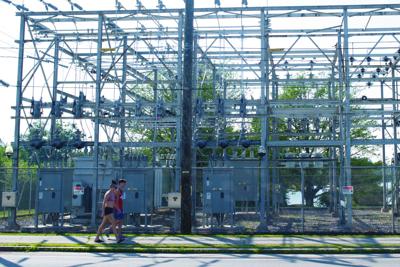Electric rates are going up across the board, but that’s got little to do with your electric company.
Customers of Eversource, New Hampshire Electric Co-op and Community Power Coalition of New Hampshire can expect significant rate increases in coming weeks, set to take effect on Friday, Aug. 1.
Default service supply rates change twice a year, in February and August. That rate is going up, from $0.089 per kilowatt hour to $0.112 per kWh, and is largely influenced by the price retail suppliers have to pay wholesale for energy.
Eversource, Unitil and Liberty are the state’s three investor-owned utilities.
That increase translates to higher bills for customers, namely: an average increase for the typical Eversource customer using 600 kWh per month is expected to realize a $13.61 or 9.9% increase in their monthly bill.
The board of directors at NHEC similarly approved a rate increase. For their typical residential member using 500 kWh per month, the increase would be 9.8% or $12.39 per month.
Energy companies can either purchase power twice a year on the wholesale market, or on the spot-market if they’re in need of more. All try to mitigate exposure to the spot-market to hedge against price variability. Prices float hour to hour.
“While we do not control wholesale energy costs, the staff and Board Directors have worked hard in other areas to help keep rates for members as affordable as possible,” NHEC Board Chair Bill Darcy wrote in a press statement.
The supply rate change only affects customers receiving energy through the default service rate, but approximately 45% of Eversource customers, for example, receive electricity through a community power program or alternate supplier.
“Eversource does not generate electricity and is required to purchase power on behalf of customers who take its Default Service rate, and those costs are passed on with no markup or profit to the company,” a press release reads, in part.
For Community Power Coalition of New Hampshire, an aggregate service which seeks to cobble together various communities and municipalities in order to garner greater purchasing power, customers can expect an average $26 increase in their monthly bill, according to the Portsmouth Herald.
While summer heat has something to do with energy usage, energy prices are influenced most by the wholesale market and by extraneous, somewhat amorphous factors affecting the broader energy market — namely, natural gas and pedestrian inflation. And wholesale energy suppliers, who rely on natural gas, may be feeling nervous.
Electricity is generally much more expensive in January and July, for example, when the climate reaches extremes each year. And all of those retail electric providers are purchasing power wholesale. Natural gas, in particular, plays a sizable role in the energy market here.
New Hampshire and other New England states are party to a regional electrical system: ISO New England. ISO New England monitors energy demand to ensure there’s enough supply. In 2021, according to the New Hampshire Department of Energy, 46% of electricity supplied in the Granite State came from plants using natural gas to produce electricity.
The natural gas supply is located in other parts of the country and transported to New England broadly, and New Hampshire specifically, through pipelines. When the price of natural gas varies, whether due to external geopolitical factors or because of increased day-to-day demand, it impacts the real cost of electricity.
Energy markets here and around the world are volatile, and supply can be restricted by factors including increased usage following the COVID pandemic, the general rise in price inflation of goods and services or uncertainties abroad due to conflict, particularly in energy-producing regions like Russia or Ukraine.
“Nobody escapes the market fundamentals,” state Consumer Advocate Donald Kreis said in an interview.
Differences between prices offered by various retailers have more to do with geography and infrastructure than other factors — they’re all paying about the same rate on the wholesale market.
New Englanders also pay the highest electric transmission rates in the country. Transmission refers to the high-powered electric grid which moves electricity across vast distances and is operated by ISO New England. Retail electric suppliers are beholden to that infrastructure in order to deliver power to an individual home or business.
Customers can do their part to reduce the impact of rate increases by shopping around: all retail providers operate on the same monopoly distribution system of poles and wires, but individuals have the ability to choose where they buy.
The monopoly is something of a natural one — it would be economically inefficient to construct and maintain rival poles and wires statewide, but that constrains the retail sale of power to residential customers: everyone is a captured customer.
About 50% 60% of your monthly bill is your energy charge. The rest is about transmission, Kreis said. And customers might not realize how expensive the transmission system has become — energy companies regularly go to the state’s Public Utility Commission to request infrastructure upgrades, which contributes to overhead costs.
Eversource, for their part, offers assistance in the form of flexible payment plans, averaged month-over-month billing plans, an income-based program which involves forgiving or eliminating portions of an unpaid balance, and suggestions regarding energy efficiency.
But the growing influence in the residential market earned by state community power does represent a viable alternative for consumers. As Kreis puts it, the only responsibility the community power coalition has is to its constituents — towns, cities, counties and the rest. They’ve grown to become the second-largest load-serving entity in New Hampshire.
“Suddenly you do have a viable alternative to the default service,” he said.


















(0) comments
Welcome to the discussion.
Log In
Keep it Clean. Please avoid obscene, vulgar, lewd, racist or sexually-oriented language.
PLEASE TURN OFF YOUR CAPS LOCK.
Don't Threaten. Threats of harming another person will not be tolerated.
Be Truthful. Don't knowingly lie about anyone or anything.
Be Nice. No racism, sexism or any sort of -ism that is degrading to another person.
Be Proactive. Use the 'Report' link on each comment to let us know of abusive posts.
Share with Us. We'd love to hear eyewitness accounts, the history behind an article.